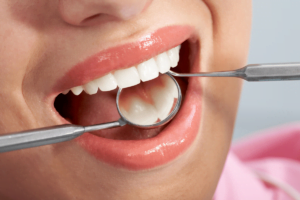Understanding Tooth Sensitivity
Tooth sensitivity can be a nagging discomfort, affecting your daily life and enjoyment of certain foods and beverages. Understanding the factors contributing to tooth sensitivity is crucial for maintaining good dental health. At J Street Dental Group, we’re committed to educating our patients about the causes of tooth sensitivity and providing practical solutions to alleviate this issue.
Table of Contents
 Why Do Teeth Get Sensitive?
Why Do Teeth Get Sensitive?
Tooth sensitivity occurs when the enamel, the protective outer layer of the tooth, becomes compromised, exposing the underlying dentin and nerve endings. This exposure can lead to discomfort when consuming hot or cold foods and beverages and sweet or acidic substances. Several factors can contribute to tooth sensitivity, including lifestyle habits and underlying dental conditions.
Enamel Erosion and Gum Recession
Enamel erosion and gum recession are common culprits behind tooth sensitivity. Enamel erosion can occur due to acidic foods, tooth grinding (bruxism), or excessive consumption of tooth-whitening products. Similarly, gum recession exposes the teeth’ sensitive roots, often due to aging, poor oral hygiene, or gum disease.
Tooth Decay and Cracked Teeth
Tooth decay and cracked teeth can also lead to tooth sensitivity. When decay or cracks compromise the integrity of the tooth structure, it exposes the inner layers to external stimuli, causing discomfort. Dental procedures such as fillings or crowns may exacerbate sensitivity temporarily but typically improve with time.
Lifestyle Factors and Habits
Certain lifestyle factors and habits can contribute to tooth sensitivity. Abrasive brushing techniques and toothpaste ingredients like baking soda can wear down enamel over time, leading to sensitivity. Additionally, consuming sugary foods and beverages increases the risk of tooth decay and sensitivity.
Genetic Predisposition and Medical Conditions
Genetics can play a role in determining susceptibility to tooth sensitivity. Some individuals may inherit thinner enamel or predispositions to conditions like bruxism, increasing their likelihood of experiencing sensitivity. Certain medical conditions, such as acid reflux or bulimia, can also contribute to enamel erosion and sensitivity.
Managing Tooth Sensitivity
While tooth sensitivity can be bothersome, there are steps you can take to manage and alleviate discomfort. It’s essential to consult with a dental professional for personalized advice and treatment options tailored to your specific needs.
Maintain Good Oral Hygiene
Practicing good oral hygiene is paramount in preventing tooth sensitivity. Brushing with a soft-bristled toothbrush and using fluoride toothpaste can help protect enamel and reduce sensitivity. Flossing daily and attending regular dental check-ups are also crucial for maintaining optimal dental health.
Limit Acidic and Sugary Foods
Reducing the consumption of acidic and sugary foods can help prevent enamel erosion and tooth decay, contributing to sensitivity. Opt for water or dairy products to neutralize acids in the mouth and minimize exposure to erosive substances.
Use Desensitizing Toothpaste
Desensitizing toothpaste containing potassium nitrate or strontium chloride can help alleviate tooth sensitivity over time. These toothpastes work by blocking nerve signals and providing relief from discomfort.
Address Underlying Dental Issues
If tooth sensitivity persists despite preventive measures, addressing any underlying dental issues is essential. Your dentist may recommend treatments such as dental sealants, fluoride varnishes, or dental bonding to strengthen enamel and reduce sensitivity.
Q&A: Common Questions About Tooth Sensitivity
Q: Can tooth sensitivity be a sign of a more serious dental problem? A: In some cases, persistent tooth sensitivity may indicate underlying dental issues such as tooth decay, gum disease, or cracked teeth. It’s essential to consult with a dentist to rule out any serious concerns and receive appropriate treatment.
Q: Are there any home remedies for tooth sensitivity? A: While home remedies like rinsing with salt water or applying clove oil may provide temporary relief, addressing the underlying cause of sensitivity with professional dental advice is crucial.
Q: Can tooth sensitivity be reversed? A: Depending on the cause and severity of tooth sensitivity, it may be possible to reverse or alleviate symptoms with proper dental care and treatment. Your dentist can recommend personalized strategies to manage sensitivity effectively.
 Take Control of Your Dental Health
Take Control of Your Dental Health
Don’t let tooth sensitivity interfere with your quality of life. Take proactive steps to protect your dental health and seek professional dental advice if you experience persistent sensitivity. At J Street Dental Group, we’re here to help you achieve a healthy, pain-free smile. Contact us today to schedule a consultation and learn more about managing tooth sensitivity effectively.


 Why Do Teeth Get Sensitive?
Why Do Teeth Get Sensitive? Take Control of Your Dental Health
Take Control of Your Dental Health
